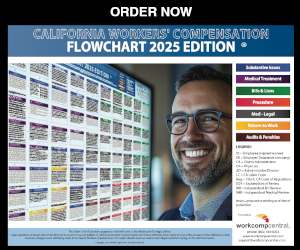Industry Insights
March 27, 2018
Wickert: Recovering Workers' Compensation Lien Out of Legal Malpractice Award
- State: California
- - 0 shares
There is little law in California regarding the subrogation/reimbursement and/or future credit rights of an employer or workers’ compensation carrier when an employee makes a third-party recovery because of legal malpractice in the handling of the employee’s attorney.

Gary L. Wickert
This is surprising, given that California usually leads the nation on cutting-edge issues such as this. Despite the paucity of law on the subject, a recent Workers’ Compensation Appeals Board order seems to congeal the limited precedent out there into a ruling that prohibits the carrier from subrogation/reimbursement rights or the right to a future credit out of a legal malpractice tort recovery.
If an employee’s third-party tort claim is harmed due to the legal malpractice of the employee’s attorney, such as a complaint not being filed until after the statute of limitations has run, states differ as to whether the workers' compensation carrier should benefit from the employee’s legal malpractice lawsuit and recovery.
States including Alaska, Minnesota, New Jersey, New York, Oklahoma, Oregon, Pennsylvania, Tennessee, Texas, Utah and Virginia allow the workers' compensation carrier to be reimbursed out of, and take a future credit for, any recovery the employee makes in such an action.
Other states, including Alabama, Arizona, Connecticut, Delaware, Florida, Illinois, Iowa, Louisiana, Michigan, Missouri, North Carolina, North Dakota and Wisconsin, do not. The remaining states are either undecided or have precedent that is murky and unclear on the subject.
The only California decision on this subject that does exist appears to deny the employer and/or carrier a right of subrogation and/or reimbursement out of the proceeds of a successful legal malpractice action.
In Soliz v. Spielman (1974), an employee who had collected workers' compensation benefits hired a lawyer to bring a third-party action against the party responsible for causing the work-related injury. The attorney waited until after the statute of limitations ran before he filed the lawsuit, resulting in dismissal.
The employee thereafter brought a legal malpractice action against the attorney, and the workers' compensation carrier intervened and filed a notice of lien claim. After two days of trial, the employee settled the malpractice action and the superior court struck the carrier’s notice of lien.
On appeal, the Court of Appeals held that the plaintiff’s attorney who allowed the statute of limitations to run was not liable to the employer or carrier that would have had a right of reimbursement had the third-party lawsuit been successful.
The reason it gave — the employer was entitled to bring its own third-party suit against the tortfeasors but didn’t — seems both arbitrary and counterproductive to the public policy of limiting lawsuits, especially duplicative lawsuits. Nonetheless, that was the decision.
It serves as a reminder to workers’ compensation carriers that, for several reasons, California remains a jurisdiction where you should engage subrogation counsel and intervene into third-party actions. Filing a notice of lien should be limited only to the smallest of liens where the financial loss of the plaintiff settling around the carrier is minimal.
The few WCAB decisions that discuss the issue of subrogating against legal malpractice actions are conflicting. Two of them hold that the lack of a duty owed by the employee’s attorney to the carrier means that a legal malpractice third-party action could not be pursued (Assurance Co. of America v. Haven, 1995; El Katan v. Barrett Business Services, 2013).
Another suggests that Soliz v. Spielman prohibits such an action (Escamilla v. Cacique Inc. and Travelers Ins. Co., 2016). However, two more WCAB decisions hold that “recover” as contemplated in § 3861 includes proceeds from “fourth-party” claims (legal malpractice and bad-faith claims) filed by an employee (Monarrez v. WCAB, 1991; Myrick v. WCAB, 1998).
In this connection it should be noted that WCAB panel decisions are not binding, while en banc decisions are (Gee v. WCAB, 2002). However, the WCAB may consider panel decisions to the extent they are persuasive (Guitron v. Santa Fe Extruders, 2011).
In Escamilla v. Cacique Inc. and Travelers Ins. Co., the employee’s attorney filed the third-party suit after the statute expired, and the carrier intervened. The carrier did not file its own action. After the employee recovered $179,805 in the legal malpractice suit, the carrier applied for a future credit with the WCAB.
The workers’ compensation administrative law judge denied the petition for a credit, and the carrier sought reconsideration en banc. The WCAB affirmed the workers’ compensation administrative law judge, referring to legal malpractice cases as “fourth-party” actions, and noting that the carrier failed to fulfill certain procedural filing requirements (Cal. Code Regs. §§ 10205, 10205.12 and 10301).
The label of “fourth-party action” is technically a misnomer, because the term “third party” refers to a party other than the employee and the employer, which would include a lawyer from whom a legal malpractice recovery is made. However, the distinction the court made is that, while a medical malpractice action involves negligence that exacerbates or increases the amount the worker’s compensation carrier has and will pay to, or on behalf of, the employee, a legal malpractice action does not.
In its order, the board again noted that the carrier could have filed, but chose not to file, its own third-party action against the tortfeasor.
It now appears that in California, in addition to the threat of the employee settling around the workers’ compensation carrier, any dismissal of the third-party action due to the plaintiff’s attorney’s negligence will leave the carrier empty-handed.
States that have allowed subrogation against legal malpractice actions, such as New York, use the logic that the carrier should be subrogated to any remedy that allows the employee satisfaction of his damages (McDowell v. LaVoy, 1978).
While the law appears to lean in favor of disallowing a worker’s compensation carrier in California to recover its lien and/or a future credit out of a recovery obtained in a legal malpractice action, the lesson learned is that California remains a state in which a subrogated carrier has no choice but to engage qualified workers’ compensation subrogation counsel to protect its subrogation/reimbursement and future credit rights.
Gary Wickert is a partner with the Matthiesen, Wickert & Lehrer law firm in Hartford, Wisconsin. This blog post is reprinted with permission.
Advertisements
Columns
- Montgomery: More States Move to Expand Workers' Comp PTSD Coverage 04/28/25
- Gelman: The Toll of Neglect 04/25/25
- CAAA: Fraud in the Workers' Comp System 04/23/25
- Gelman: Broken Medical Promises 04/21/25
- Langham: Never Give Up, Never Surrender 04/18/25
- CAAA: The Dismantling of NIOSH 04/16/25
- Ahmed: Strategies for Successful Negotiation 04/14/25
- Shabestari: Addressing Venue in Work Comp Claims 04/11/25
- Snyder: Do You Trust Your Mediator? 04/09/25
- Gelman: Beyond the Knife for Back Pain Relief 04/04/25
- Montgomery: Changes to Workers' Comp DME Authorization 04/02/25
- Langham: Notice of Unavailability 04/01/25
- Moore: Critical Workers' Comp Business Change Reporting Requirement 03/31/25
- Mussack: AMA Guides, State PDRS Can Differ on Rating Instructions 03/28/25
- Kamin: Hope Springs Eternal With New District Attorney 03/26/25
- Langham: DOGE 2025 03/24/25
- Paduda: What's Happening in Work Comp M&A? 03/21/25
- Gelman: Will DOGE Changes Cause Workers' Comp Costs to Rise? 03/20/25
- Gelman: High Court OKs Referral Fees 03/19/25
- Snyder: The Importance of Taking Notes 03/17/25
Now Trending
- Workers' Compensation News
-
Calif. Four
Charged in Alleged Capping Scheme
Targeting Spanish-Speaking…
Posted on Apr 25, 2025
-
Calif. Insurance
Committee Passes SIBTF, IBR…
Posted on Apr 24, 2025
-
Calif. Comp Claim
From Staged Robbery Leads to Fraud…
Posted on Apr 25, 2025
-
Calif. Amended
Bill Requires Negative Impact of
Preexisting Disability for SIBTF…
Posted on Apr 23, 2025
-
Calif. Court
Affirms Jury's Verdict Finding L.A.
Failed to Engage in Interactive…
Posted on Apr 22, 2025
-
Calif. Court
Denies Motion for Acquittal, New
Trial by Labor Org Convicted of…
Posted on Apr 21, 2025
-
Calif. Business
Owner Sentenced to Jail for
Insurance Fraud, Tax…
Posted on Apr 28, 2025
-
Hawaii High Court:
Landlord Failed to Rebut
Presumption That Tenant Was…
Posted on Apr 25, 2025
-
Ntl. DOJ Announces
$300 Million Opioid Settlement With…
Posted on Apr 22, 2025
-
Texas Texas Mutual
Offers $8 Million in Grant…
Posted on Apr 28, 2025
Jobs
Upcoming Events
May 12-14, 2025
NCCI Annual Insights Symposium
NCCI's Annual Insights Symposium (AIS) 2025 will deliver data-driven insights, providing workers c …
May 12-13, 2025
CSIA 2025 Annual Conference
The Board of Managers is excited to announce that the CSIA 2025 Annual Meeting and Educational Con …
Jun 11-13, 2025
CCWC 2025 Educational Conferen
For two decades, CCWC has assembled the key players in the workers’ compensation arena for what is …
Social Media Links
c/o Business Insurance Holdings, Inc.
Greenwich, CT 06836




No Comments
Log in to post a comment